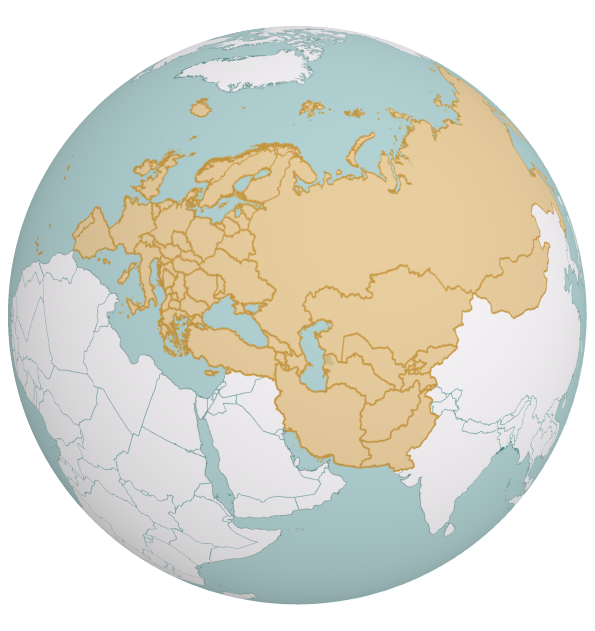And here is a small summary of major geopolitical events
of November 2022 in the Eurasian space…
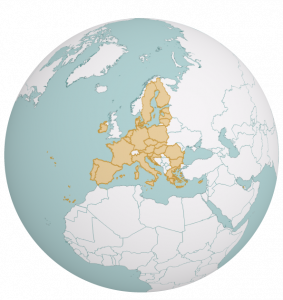 European Union: US snubs to France against the background of NATO orientation of European foreign policy.
European Union: US snubs to France against the background of NATO orientation of European foreign policy.
The beginning of November was marked by a disputed visit by German Chancellor Olaf Scholz to China on November 4, the first EU leader to have been received in this country since the start of the Covid-19 pandemic. Highly contested move within the EU, especially since Germany authorized the sale of a 24.9% share of a terminal in the port of Hamburg to China, and while the context is the search for a European consensus on energy issues and on Taiwan.
In addition, four days before the start of COP 27 in Sharm el-Sheikh in Egypt on November 6, chaired by the United Arab Emirates, Warsaw signed an agreement with the American company Westinghouse on the construction of its first nuclear power plant on November 2, new US snub to its French partner who had also positioned itself on this market, further aggravated by the remarks of the German Chancellor on November 30 who said he was “determined” to finalize the purchase of 35 F35-A fighter bombers from the American manufacturer Lockheed-Martin.
On November 4, the 45th session of the 77th session of the United Nations General Assembly saw the adoption of a resolution on “the fight against the glorification of Nazism” with 105 votes in favor but 52 votes against and 15 abstentions, including all European countries arguing for the most part that Russia has politically exploited this issue since 2012 in the context of the conflict with Ukraine. On the same day, NATO Secretary General Jens Stoltenberg met with the Turkish President in Istanbul to take stock of the situation in Ukraine, where Turkey plays a key role in controlling the straits in the Black Sea, but also to broach the subject of the reinforcement of NATO by the accession of Finland and Sweden, which this country is again threatening with a veto. It should be noted that Budapest postponed on November 24 the ratification of the accession of Sweden and Finland to NATO until the beginning of 2023, citing a legislative slowness in the Hungarian Parliament because of the anti-corruption measures to be taken, Brussels still freezing close 7.5 billion euros of European funds for this purpose.
The explosion of a missile in Poland on November 15, less than ten kilometres from the Ukrainian border, was the subject of reciprocal accusations from Kyiv and Moscow, while Poland declared that “there was no indication that it was a personal attack on Poland” and that it was probably an “isolated incident“. No responsibility has been clearly established following the numerous meetings held, such as that of NATO ambassadors or G20 leaders or those of the EU on the sidelines of the G20 on November 16.
On November 14, the EU took the decision to add to a restrictive list 29 people and 3 Iranian entities in the context of non-respect of human rights during the G20 in Bali, following that published on October 17. And on November 23, the European Parliament adopted by 494 votes for and 58 votes against a resolution recognizing Russia as a “State supporting terrorism” and “which uses the means of terrorism”. Its website was the victim of a cyberattack the same day by a group claiming to support the Kremlin.
Several decisions were taken by the European institutions this November. Resolution of 23 November adopted with 502 votes for, 75 against and 61 abstentions aimed at facilitating the procedures for accession to the European Union by providing for the replacement of the unanimity rule by that of qualified majority (approval of 15 of the 27 States), and conditioning on strict respect for human rights and the rule of law, tougher restrictions on candidate countries and/or EU partners who are reluctant to political reform (thus targeting Georgia or the Balkan). Agreement between the energy ministers on new measures relating to joint gas purchases and on a solidarity mechanism, a mechanism nevertheless highly criticized by Spain, France and Germany and for which the countries were able to agree only on a partial price cap with multiple conditions. Adoption by the Council of the European Union of a general orientation for the defence industry, approving the Commission’s proposal to devote 500 million euros by 2024 to encourage joint acquisitions of military equipment.
It should be noted the launch on November 17 of IRIS – Infrastructure for Resilience and Interconnection Secured by Satellites, a 6 billion euro satellite constellation project intended to secure the Internet and communications, which should be fully operational in 2027.
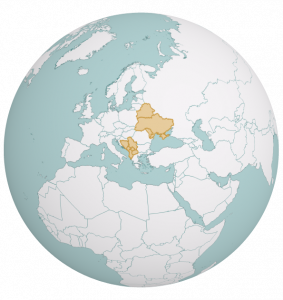 Eastern Europe: The freezing of positions around Ukraine and the renewed tension between Serbia and Kosovo.
Eastern Europe: The freezing of positions around Ukraine and the renewed tension between Serbia and Kosovo.
The beginning of November was marked by Russia’s announcement on November 2 of its return to the Black Sea grain initiative, a few days after its decision to suspend the agreement on the export of grains, agreement considered essential by the FAO, since it must make it possible to meet the basic food needs of 45 countries, including 33 in Africa, and after the Joint Coordination Centre (JCC) of the initiative, based in Istanbul, declared that the UN, Turkish and Ukrainian delegations had agreed to set up inspections on 40 boats leaving Ukrainian ports from Monday 31 October.
Following the installation of Kinzhal hypersonic missiles (capable of dodging missile defence systems) in Belarus at the beginning of November, a country in which the slogan “Long Live Belarus” described as Nazi was banned on November 10, and concerning which an investigation by the investigative newspaper “Disclose” revealed on November 17 that ten suppliers from Belarus to Ikea had made prisoners work, the city of Kherson was evacuated by the Russian armed forces on November 11 after it was announced by the Russian Defence Minister Sergey Surovikin, 48 hours earlier, a step forward of both symbolic and strategic importance. While Belarus received new Canadian sanctions, adding 16 companies and entities placed on its sanctions list on November 22, Russian strikes began to intensify the next day with more than seventy missiles fired by Russia on Ukraine, launched from the Russian regions of Volgodonsk, Rostov and the Caspian and Black Seas, and which shut down the entire Kyiv region, and suspended heating and water supply. The attacks also affected the regions of Vinnytsia, Lviv, Khmelnitsky, Odessa, Mykolayiv, Dnipro, Zaporizhia, Sumy and Kryvyi Rih, but all administrative regions suffered partial or total power cuts, some of which were accompanied by the desactivation of water stations.. The WHO had expressed its concerns about the winter challenges for Ukraine, after the numerous Russian attacks against health and energy infrastructures, on November 21, through the voice of Doctor Hans Henri P. Kluge, Regional Director of the WHO for Europe.
On November 22, Ukrainian security services carried out measures described as “counter-intelligence aimed at countering the subversive activities of Russian special services” in order to prevent the use of the Kyiv Caves Lavra Monastery, the place of residence of the Primate of the Ukrainian Orthodox Church attached to the Moscow Patriarchate, the oldest monastery in Kyiv, founded in the 11th century, as a “cell of the Russian world“ and to protect the population from provocations and terrorist attacks. On December 1, the anniversary of Ukraine’s 1991 referendum on independence, Ukrainian President Volodymyr Zelensky defended that the country’s independence required “spiritual independence” and announced that he had “instructed the government to submit to the Verkhovna Rada a draft law making it impossible for religious organizations affiliated with centres of influence of the Russian Federation to operate in Ukraine” and mandating the State Service for Ethnopolitics and Freedom of Conscience to carry out “a religious examination of the status of the management of the Ukrainian Orthodox Church”, in order to analyse the presence or not “of a canonical ecclesiastical link with the Moscow Patriarchate”. November 26 marked the commemoration of the 90th anniversary of the Holodomor, a famine in Ukraine caused by the Stalinist regime between 1932 and 1933, which resulted in up to 6 million deaths.
On November 3, the French Minister for the Armed Forces, Sébastien Lecornu, inaugurated the Cincu military camp in Romania, established as part of NATO’s AIGLE mission, with “485 housing blocks” and hosting some of the 900 soldiers Belgians, Dutch and French. The US Department of Defence announced the delivery of additional weapons to Ukraine on November 10, worth $400 million, less than a week after another military assistance program of $400 million dollars too, and while the Republicans were already approaching a narrow majority in the House of Representatives, a goal achieved in early December. On November 26, the Lithuanian, Polish and Ukrainian Prime Ministers met in Kyiv as part of the Lublin Triangle, a new regional cooperation created on June 28, 2020 inspired by the Weimar Triangle which helped Poland reintegrate European policies, and which aims to support Ukraine in its integration into Europe. They insisted on their desire to “intensify discussions within the Atlantic Alliance” on Ukraine’s integration into NATO, in the run-up to the Vilnius summit scheduled for 2023. The meeting of Ministers of NATO Foreign Affairs held in Bucharest, Romania on November 29-30, during which discussions to supply Ukraine with the “Patriot” defence system took place. US Secretary of State Antony Blinken also announced $53 million in financial assistance, in addition to another $55 million already released for Ukraine’s electrical equipment.
It should be noted that 5 companies were nationalized by Ukraine on 6 November: the hydrocarbon producer UKRNAFTA, the aeronautical manufacturer MOTOR SICH, the company specializing in the production of reactors ZAPORIZHTRANSFORMATOR, the truck manufacturer AVTOKRAZ and the oil refining company UKRTATNAFTA.
Poland announced on November 2, through the voice of its Polish Defence Minister, Mariusz Błaszczak, the construction of a wall on the border, i.e. “three rows of barbed wire […] 2.5 meters high” with the Kaliningrad Oblast, following the Russian declaration of the opening of the international airport of this exclave to flights from the Middle East and Africa, fearing a new instrumentalization of migratory flows by Russia along the 180 kilometres that separate the two countries.
Moldova, for its part, has announced that it is opening an investigation into Russian influences in domestic politics, specifically “potential large sums of money offered by the FSB, the Russian secret service, to support Moldovan politicians for the purpose of to create a union in order to overthrow the pro-Western regime and to reorient the regime for the benefit of Russia” according to the Attorney General. An investigation targeting former President Igor Dodon and the Socialist Party. At the third ministerial conference of the Support Platform for Moldova, co-led by France, Germany and Romania, which took place in Paris on 21 November, this country was awarded new financial aid of more than one hundred million euros to support the 80,000 Ukrainian refugees in Moldova.
In Belarus, the Foreign Minister of Belarus, Vladimir Makei, died suddenly at the age of 64 on November 27, before an important meeting with his Russian counterpart. On November 29, imprisoned opponent Maria Kolesnikova was taken to hospital in intensive care, after undergoing surgery on November 28.
In the Balkans, Serbia has increased its combat readiness after drones were observed entering from Kosovo on 2 November, which was denied by the Kosovo authorities, a decision coming in the context of a Serbian military exercise in scale called “Maneuver 22” and Kosovar attempt to make Kosovo Serbs accept national unity laws, including the regularization of their license plates, in protest of which Kosovo Serbs have massively resigned from Kosovar state institutions, following a decision taken on November 5 at a meeting of the Kosovo Serb party “Srpska Lista” in the predominantly Serb town of Zvecan. 10 deputies also resigned from the Kosovo Parliament. Serbian President Aleksandar Vucic has announced that he will “support the Serbs” of Kosovo to defend their rights, first and foremost “respect for the Brussels agreements“, signed in 2013 under EU mediation and providing in particular for an “Association Serbian municipalities” in northern Kosovo. Similarly, the Kosovo Serb party, Srpska Lista, announced on November 15 that it would not participate in the extraordinary local elections to be held on December 18 in four Serb-majority municipalities in northern Kosovo. On 23 November, as the license plate dispute subsided following an agreement between the parties in Brussels that Serbia pledged to stop issuing these license plates, and Kosovo to have them replaced, the European Parliament has conditioned the continuation of the process of accession of Serbia, candidate for the European Union since 2012 and which renewed its wish to join the international organization of La Francophonie on November 16, to a alignment with Western sanctions against Russia as of November 23. The ambassadors of the EU Member States validated on November 30 the end of the visa regime for Kosovar nationals wishing to travel to the Schengen area.
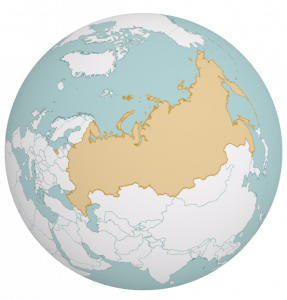 Russia: Strategic Withdrawal?
Russia: Strategic Withdrawal?
On November 1, Russian President Vladimir Putin announced the end of the mobilization decreed on September 21, despite the absence of an ukaze on this subject. Following Russian accusations of a “dirty bomb” in Ukraine dated October 23, the IAEA (International Atomic Energy Agency) published the results of its investigation on November 3, its director Rafael Mariano Grossi, declaring that it did not had “not revealed any sign of undeclared nuclear activity and material“ at the three locations where the samples were taken.
Then on November 9, the Russian military withdrawal from the western bank of the Dnieper where the city of Kherson is located began, announced by General Sergei Surovikin, head of the “special military operation”, and confirmed by Sergei Shoigu, Minister of the defence. Kherson had been taken over by Russian forces in March and recognized as Russian territory on September 30. On the same day, basic military training in Russian schools was announced by the Russian Ministry of Education for the start of the 2023 school year.
The Russian-Iranian summit on security issues on November 9 in Tehran saw the meeting of the current Secretary of the Security Council of the Russian Federation, Nikolai Patrushev, with the Iranian President, Ebrahim Raisi, and the expression of the need for the two countries to “increase the exchange of experience in developing the economic potential of Russia and Iran and building foreign trade relations under the pressure of sanctions“.
It should be noted that on November 12, Russian Deputy Foreign Minister Sergei Vershinin told reporters that “the reconnection [to SWIFT] of the Rosselkhozbank [Russian Agricultural Bank] [was] a key issue“ to facilitate the exchanges in the agricultural and food fields; these economic sectors being excluded from Western sanctions against Russia. Important statement issued the day after the meeting between Russian officials and UN representatives in Geneva, which discussed the Black Sea grain initiative.
The missile strike that hit Poland on November 15 has been called a Ukrainian “provocation” by Russia considering that the Russian-made missile was redirected by a Ukrainian air defence system, the United States contesting, as to them, the intentional nature of the maneuver. This episode was nevertheless a pretext for Ukrainian President Volodymyr Zelensky’s request to NATO to “act“. On the same day, Russia participated in the G20 in Bali, represented by its Foreign Minister Sergei Lavrov, in the absence of Vladimir Putin contesting the presence of the Ukrainian President at this intergovernmental forum. If the new Prime Minister was particularly critical and the Heads of State refused to pose for the photo with the Russian representative, Dmitry Peskov, Kremlin spokesman judged that “the Russian voice [was] heard” and that the final text approved on November 16 was “balanced”.
Tensions were felt with Sweden on November 21 and 22. While this country communicated the results of its investigation into the explosions of the Nordstream 1 and 2 gas pipelines, on November 21, namely the discovery of “foreign objects and traces of explosives on them” at the sites of the damage, i.e. 4 holes on the 2 gas pipelines 250 m apart, following which Sergei Lavrov declared that it was “Anglo-Saxon sabotage“, the Swedish Homeland Security Service arrested a Russian-Swedish couple, the next day, in Stockholm, suspected of illegal industrial espionage activities against Sweden. It should be noted that on November 30, Germany and Norway joined forces to request NATO intervention to protect the underwater infrastructure following this sabotage, whereas the day before Germany declared by the voice of its Minister of Justice, Marco Buschmann: “the decision to prosecute Nord Stream 2 after the annexation of Crimea in 2014 was Germany’s contribution to the outbreak of the war in Ukraine“. Also on November 22, Vladimir Putin attended a flag-raising ceremony on the icebreaker ship Ural and the launch of the construction of the ship Yakutia, ships supposed, according to the Kremlin, to give Russia the status of “great power of the Arctic“.
At the domestic level, it should be noted the resignation of Alexei Kudrin, a close associate of Vladimir Putin, destined to take the helm of the private company Yandex, from his position as President of the Court of Auditors, in a context of rising influence of “harder” political lines within the political system. In addition, on December 1, a Russian law, establishing a list drawn up by the FSB of information in the military and military-technical fields prohibited from public debate came into force.
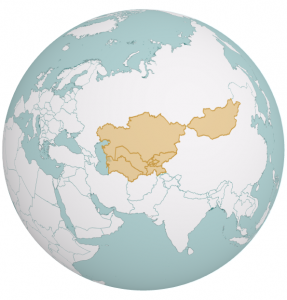 Central Asia /Mongolia: The re-election of the Kazakh president and the continuation of Central Asian “multi-vector” policies.
Central Asia /Mongolia: The re-election of the Kazakh president and the continuation of Central Asian “multi-vector” policies.
November in Central Asia was marked by the re-election of President Kassym-Jomart Tokayev with 81.31% of the vote on November 20, following the early presidential elections that took place in Kazakhstan, in accordance with the constitutional referendum of June 5, 2022. This election takes place in a context of profound constitutional reforms initiated by the Head of State, including in particular the reduction of the presidential mandate to seven non-renewable years and a review of all the political institutions of the country aimed at strengthening the power of the Parliament and put an end to the hyper-presidentialisation of the regime. On November 29, the Kazakh President was visiting Paris to meet his counterpart Emmanuel Macron, the day after his meeting with Vladimir Putin in Moscow: Kazakhstan is one of the main suppliers of uranium and crude oil to France and has more than 170 French companies established on its territory. The two Heads of State discussed at length all the issues relating to the implementation of joint projects in the sectors of energy, industrial infrastructure, aerospace, engineering, food and humanitarian aid, but also underlined the importance of continuing partnerships between research centres and medical centres in the two countries, particularly in oncology, the management of hospital establishments and the provision of care, and they also affirmed their support for the project to open two French schools in Astana and Almaty, as well as the project to refound the Sorbonne-Kazakhstan Institute.
On November 21 and 22, Emmanuel Macron also received the President of the Republic of Uzbekistan, Shavkat Mirziyoyev, who took part in the inauguration of the exhibition “Splendours of the Oases of Uzbekistan” at the Louvre Museum and “On the Samarkand roads. Wonders of silk and gold” at the Institut du Monde Arabe. The two leaders expressed their desire to strengthen bilateral cooperation in the field of security, the fight against international terrorism, to increase trade, economic and investment cooperation, in particular by increasing the volume of turnover trade and the number of joint projects and programs involving advanced technologies. They also insisted on the need to consolidate industrial cooperation, as specified in the economic roadmap of France and Uzbekistan for 2020-2030.
On November 3, Uzbekistan and Kyrgyzstan signed several agreements in Bishkek concerning the delimitation of their borders, in particular concerning the joint management of water resources in the Kempir-Abad reservoir, in the province of Andijan, while a 20 people were arrested in Kyrgyzstan for protesting against the new demarcation of the water reservoir. Agreements which come before the meeting of the two heads of state and which made it possible to address the issues of implementation of major joint infrastructure and energy projects, including the construction of the China-Kyrgyzstan-Uzbekistan railway.
The Kyrgyz government also met with the authorities of the Taliban regime in Kabul on November 6 in the context of regional security issues: without recognizing its full legitimacy, Kyrgyzstan, which is one of the few countries to maintain an embassy in the country nevertheless mentioned bilateral agreements related to transport corridors and the possibility of providing humanitarian aid to the Afghan people.
November 16 was the date of the Day of the President of the Republic of Tajikistan, Emomali Rahmon bearing the title of “founder of peace and national unity and leader of the nation”, a demonstration strongly opposed by the political opposition.
Turkmenistan hosted, on November 15, in Ashgabat, a Russian interministerial delegation headed by the Vice-President of the Government of the Russian Federation and co-president of the Turkmen-Russian Intergovernmental Commission on Economic Cooperation, Alexey Overchuk, in order to discuss partnership prospects in the financial and banking sectors, the oil, transport and electric power industries, as well as in the fields of education, culture, health care and administration tax. On 28 November, the Russian and Kazakh Presidents, Vladimir Putin and Kassym-Jomart Tokayev, met in Moscow within the framework of the 28th Russian-Kazakh Interregional Cooperation Forum, on the occasion of which the Kazakh Head of State told his Russian counterpart that Russia was still Kazakhstan’s main strategic partner, despite their differences over the Russian-Ukrainian conflict. Among the main projects mentioned were the expansion of the capacity of cross-border road crossings with Kazakhstan and the increase in the transport of goods by sea.
On the Mongolian side, the month of November was marked by several bilateral visits, embodying its “third neighborhood” policy. First, the visit of the President of the Great Khural on October 30 to South Korea, satisfied to have relaxed the visa conditions and concluded an economic partnership, the country being rich in natural resources (copper, gold, uranium, coal) and Korea developing many advanced technologies. Then, President of Mongolia Ukhnaagiin Khürelsükh arrived in Japan on November 29 for a four-day official visit, marking 50 years of diplomatic cooperation between the two countries, with Japan being one of the main investors in Mongolia. and likely to diversify its economy, ensure its food security, its energy supplies as well as its sustainable and technological development, counterbalancing Chinese influence in the region. This visit precisely followed the one made to China on November 27 and 28, at the invitation of Xi Jinping, which gave rise to the insistence of the Mongolian representatives on the development of good neighbourly relations by improving political confidence between the two countries, while agreements were signed on the establishment of Chinese investments and loans for the development of infrastructure in Mongolia, as well as a cooperation agreement between the national public radio and television stations of the two countries .
In addition, President Ukhnaagiin Khürelsükh’s speech at COP 27 on November 8 allowed him to discuss his goal of a “zero gap” between greenhouse gas emissions and their absorption by 2050, and to sign a memorandum on a partnership with the European Union, entitled “Partnership on Forests”.
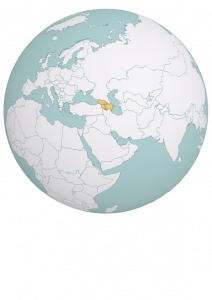 South Caucasus: Regression of the peace process between Armenia and Azerbaijan against the backdrop of Franco-Azerbaijani rivalry.
South Caucasus: Regression of the peace process between Armenia and Azerbaijan against the backdrop of Franco-Azerbaijani rivalry.
The peace process between Azerbaijan and Armenia over Karabakh seemed to show some regression in November, as evidenced by the multiplication of reciprocal accusations of breaking the ceasefire, which have become almost daily the last two weeks of November and Azerbaijan’s decision to cancel the next meeting in Brussels initially scheduled for December 7, due to the Armenian attempt to impose the French presence there, justifying it as falling following on from the meeting in Prague.
Indeed, this month of November was strongly marked by the increase in tensions between France and Azerbaijan. As early as November 2, Ilham Aliev was sending crystal clear messages to France from the 3rd Arab Summit in Algiers drawing parallels between France’s colonial past and the Armenian occupation of its territory and declaring: “Hypocrisy seems to be the guideline of French public policy. Today, this hypocrisy is disguised under the name of democracy”. Then on November 15, the French Senate adopted a motion for a resolution in favour of recognition of the “Republic of Nagorno-Karabakh” 295 votes for and 1 against before the French National Assembly adopted resolution n ° 37 on November 30 November inviting the government to accentuate France’s support for Armenia with regard to its defence capabilities and to consider “personal economic sanctions” against Azerbaijan. Heated exchanges also regarding Armenian demands during the Francophonie Forum in Djerba on November 19-20, with the Azerbaijani Foreign Ministry denouncing “unilateral, biased and distorted provocative provisions against Azerbaijan […] included with the direct support of France to the initial texts of the final documents of the Summit, namely the Declaration of Djerba, […which] offer a possibility of inciting Armenia’s political propaganda tools”.
Azerbaijani tensions also with Iran, which has signed a memorandum of understanding with Armenia to double Iranian gas deliveries. Armenia already imports 365 million cubic meters per year, which it has been trading for electricity since 2009, at the rate of 1 cubic meter of gas for 3 kWh of electricity from its thermal power stations. On November 7, the Iranian Ministry of Intelligence announced the dismantling of a group of 26 terrorists responsible for the recent attacks in Shiraz by attributing the coordination of this group to an Azerbaijani national while the figure of Mahmudali Chehreganli, the self-proclaimed leader of the Movement of national awakening of South Azerbaijan, advocating for the secession of the northern part of Iran with an ethnic Azeri majority, which would have been prohibited from entering Azerbaijani territory under an informal agreement dating from 2006, had been the subject of several appearances on Azerbaijani television in recent weeks. On November 11, the Iranian ambassador to Baku, Seyyid Abbas Mousavi, was summoned by the Azerbaijani Foreign Ministry and on November 14, the Azerbaijani state security services dismantled an Iranian “spy network”. The very words of Azerbaijani President Ilham Aliev regretting on November 25 that “there [was] no Azerbaijani schools in Iran” have been noticed.
The two sides of Azerbaijan and Armenia thus continue to accuse each other of blocking the process of resolving the conflict, as Ilham Aliyev expressed to the delegation of envoys of the EU and EU member states for partnership Oriental on a visit to Armenia and Azerbaijan on November 17, or by Nikol Pashinan on November 16 before the National Assembly, and to exploit the “mediators” chosen or not, Azerbaijan holding a speech with thinly veiled threats, capitalizing on its position as the winner of the last “44-day war”, and Armenia playing “the genocide card” and weighing its Russian or “Western” partnerships in a rhetoric of “cultural survival”. Indeed, Armenia, which announced the increase of its 2023 defence budget “by 113% compared to 2018, i.e. more than double, and by 47% compared to 2022” clearly expressed its criticisms vis à vis of the CSTO in recent months and shuns her Russian partner and it refused to sign two documents relating to the assistance provided to her country during the last extraordinary meeting of the Collective Security Council of the CSTO on November 22 and 23 in Yerevan while asking for “A political assessment of the events […necessary] from the moral point of view […and] the restoration of the territorial integrity of [their] country […not meaning] a military intervention” and this, in a context of popular demonstrations in Yerevan demanding that the country leaves the organization.
It should also be noted that during the 29th OSCE Ministerial Council in Lodz, Armenia and Hungary announced the “restoration of full diplomatic relations”, following relations broken in 2012 following extradition by Hungary of an Azerbaijani lieutenant, Ramil Safarov, convicted of the ax murder of an Armenian army officer in 2004, during a joint NATO training program in Budapest. With regard to Azerbaijan, Ilham Aliyev’s visits to Albania on November 15, the first visit of an Azerbaijani president to the country, and to Serbia on November 23 made it possible to deepen gas cooperation within the framework of the TAP, which is supposed to double the Azerbaijani supply to Europe by 2027, as well as the signing of 7 bilateral agreements and the association of the two leaders in a common criticism of the lack of respect for law by international organizations, while Serbia is isolated on the European scene. Ilham Aliyev also defended the “Zangezur Corridor” project at the international conference “Along the Middle Corridor: Geopolitics, Security and Economy” on November 25 in Baku.
In Georgia, the Tbilisi Court of Appeal upheld the 3-year and 6-month prison sentence of Nika Gvaramia, director of the Mtavari Arkhi television channel, on 2 November, his lawyer saying that this decision took “not only the freedom to Nika Gvaramia but also that of the country and [prevented it] from continuing on the path of European integration“.
On November 26, Civil Society Organizations issued a joint statement regarding the state of health of Mikheil Saakashvili, the former president and founder of the main opposition “United National Movement” party still imprisoned, and President Salome Zourabishvili reportedly said on November 24 that he was “closely monitoring” the health of the former president. On November 28, the Georgian government announced that it had decided to send the draft law on desoligarchization to the Venice Commission, and the subsequent suspension by Parliament of the vote on the bill in the 3rd hearing pending the opinion of this Commission. On November 20, the United National Movement proposed its own law on deoligarchization in the Georgian parliament. The European Commissioner for Neighbourhood and Enlargement, Oliver Varheli, went to Georgia on November 15 and 16 to ask for this law “to intensify the work in the fight against organized crime”.
The “foreign ministers” of Abkhazia and South Ossetia met in Moscow on November 8 while the co-chairs of the Geneva International Discussions were in Sokhoumi and Tskhinvali where these parties expressed their “concerns about the ongoing military expansion of foreign states into the territory of Georgia” (South Ossetia) or underlined “a high probability of an escalation of tension in the region due to Georgia’s military activity” (Abkazia). The 109th meeting of the Incident Prevention and Response Mechanism (MPRI) took place in Ergneti on November 10, always focusing on people regularly detained in separatist entities and the phenomenon of “borderisation” on the one hand, and on the presence of the Georgian checkpoint near the village of Tsnelisi and the drone overflight of the other.
South Ossetian “Foreign Minister” Akhsar Dzhioev visited Moscow on November 1, where he met his “counterpart” Sergei Lavrov who said he appreciated their “balanced and objective position on what takes place within the framework of the special military operation“. A parliamentary delegation of the Union of Belarus and Russia led by Artem Turtov, chairman of the Commission for Youth Policy, Sports and Tourism of the Parliamentary Assembly, Deputy Chairman of the State Duma Committee on CIS Affairs, Eurasian Integration and Relations with Compatriots visited Abkhazia on November 3. On November 29, the “President of South Ossetia”, Alan Gagloev, met with the “Head of the Republic of Crimea”, Sergei Aksenov, in Simferopol and visited the volunteer fighters in Ukraine. On December 1, Duma Speaker Vyacheslav Volodin arrived in Abkhazia, where he discussed “common security, harmonization of legislation in the areas of social affairs, customs, [and] tax policy” while an agreement on cooperation between the Russian State Duma and the People’s Assembly of the “Republic of Abkhazia” was signed on the same day.
Ruben Vardanian was appointed “State Minister of Nagorno-Karabakh” on November 4.
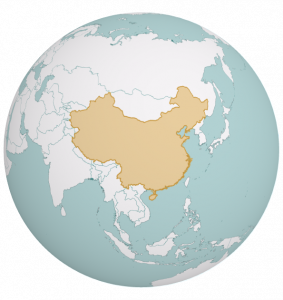 China: From the visit of the German Chancellor to the death of Jiang Zemin, against a backdrop of continued alliances in the Indo-Pacific.
China: From the visit of the German Chancellor to the death of Jiang Zemin, against a backdrop of continued alliances in the Indo-Pacific.
The trip of German Chancellor Olaf Scholz to Beijing on November 4, the first leader of the European Union to visit the Chinese leader since the start of the pandemic, but also since the renewal of his third term as leader of the Chinese Communist Party and PRC President Xi Jinping, came under heavy European pressure but was celebrated with the announcement of a $17 billion deal with Airbus and the signing of a contract by Germany with the Cosco company owned by the Chinese government and allowing the latter to hold a 24.9% share in one of the terminals of the port of Hamburg.
Charles Michel, the President of the European Council, invited on November 8 to deliver a speech at the international economic forum Hongqiao saw part of his pre-recorded speech deleted by the Chinese authorities, in particular his remarks qualifying the war in Ukraine led by Russia “illegal“.
A report by Canadian news services regarding Chinese interference in the 2019 and 2021 Canadian elections was forwarded to Prime Minister Justin Trudeau dated November 7 who denounced China’s “aggressive” moves who commented by the voice of Chinese Foreign Ministry spokesman Zhao Lijian in saying that China has “no interest in Canadian internal affairs“. The meeting between Chinese and Australian leaders Xi JinPing and Anthony Albanese on November 15, the first formal exchange between heads of state of the two countries in six years, coincides with Ottawa’s decision to block Chinese investment in companies exploiting the lithium on its soil, cutting off access to Canadian lithium. This is the beginning of a thaw that began in May 2022. As a reminder, Canberra banned Chinese donations to Australian political parties in 2017, to which Beijing responded by abruptly stopping its imports of several Australian products including barley, wine, beef, but also iron ore and coal.
The day before it was the US and Chinese leaders who met at the Asia-Pacific economic cooperation summit, Xi Jinping specifying that the case of Taiwan was “the very first red line“ and the Ministry of Foreign Affairs Chinese foreigners saying, “We hope the United States will walk the talk and abide by the one-China policy.” The positions of the two leading world powers were reaffirmed at the G20 in Bali.
The visit from 8 to 11 November to the Cambodian capital by the Chinese Prime Minister, Li Keqiang, was an opportunity for a clear rapprochement between Phnom Penh and Beijing: the two countries have signed several cooperation agreements, particularly in the field of health and concerning the restoration of the Takeo temple. Similarly, on November 20 during his meeting with the Chinese Defense Minister, General Wei Fenghe, Cambodian Prime Minister Hun Sen thanked the Chinese People’s Liberation Army for the support given to the development of its army. On November 30, a virtual meeting was held between Chinese Premier Li Keqiang and his Kazakh counterpart Alikhan Smailov, during which the two men reaffirmed their desire to strengthen their energy cooperation.
On November 30, 2 Russian Tupolev-95 long-range bombers along with 6 Chinese H-6 bombers penetrated the South Korean air defence zone in a joint exercise, which Moscow and Beijing do not recognize. Also a source of concern for Japan, which dispatched fighter jets after Chinese bombers, joined by two Russian drones, flew over from the East China Sea towards the Sea of Japan.
On the same day, Jiang Zemin, President of the People’s Republic of China from 1993 to 2003 and heir and architect of China’s opening-up dynamic, died, without any reaction from Washington, New Delhi or London, and while a part of the population of Chinese megalopolises had taken to the streets to explicitly question the legitimacy of the government.




